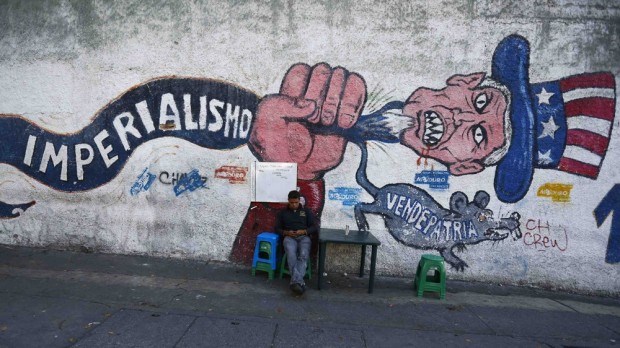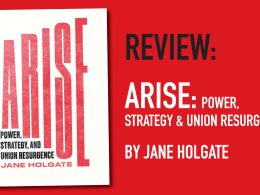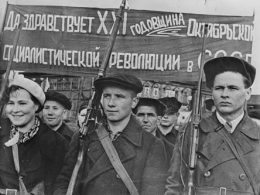On 23 January 2019, Juan Guaidó declared himself interim president of Venezuela. Shortly afterwards, he was recognised as such by the USA and Canada. A few days later, Britain, France, Germany and many others followed suit. Ann Orr looks at the ongoing attempts by imperialist forces to crush the government of Nicolás Maduro and argues that Venezuela does not represent a failure of socialism, but a stark warning about why a fundamental break with capitalism and real socialist transformation of society is required.
“This Troika of Tyranny, this triangle of terror stretching from Havana to Caracas to Managua, is the cause of immense human suffering, the impetus of enormous regional instability, and the genesis of a sordid cradle of communism in the Western Hemisphere […] The United States looks forward to watching each corner of the triangle fall. […] The Troika will crumble.”1
These were the words used to describe Nicaragua, Cuba and Venezuela by John Bolton, national security advisor to Donald Trump, in a speech last November. Together with the other two countries Venezuela is therefore once again in the sights of the White House. As indicated by this quote, but in particular his past record, the threat to these countries is serious. Bolton was US foreign secretary to the UN in 2005 during the war in Iraq. He also worked in the Bush senior and Reagan administrations. His actions included attempts to halt stronger international controls on biological weapons. More recently he has also advocated the bombing of Iran and North Korea.2 That he attempts to paint himself as standing against human suffering is absurd.
The speed at which not only Trump but also Brazil’s recently elected president Bolsonaro recognised Guaidó is also indicative of an internationally coordinated campaign. And Trump’s government continues to push for change in Venezuela, repeatedly refusing to rule out military intervention. Trump also made his intention clear when he appointed Elliot Abrams as special envoy to Venezuela. Abrams was involved in organising finances to arm paramilitary forces known as the ‘Contras’ in Nicaragua in the 1980s and was working with George Bush during the 2002 attempted coup in Venezuela. In Bolton’s words, Abrams’s actions represent a clear “cause of immense human suffering” and “impetus of enormous regional instability” although neither are likely to recognise it as such.
Chavez in power
The attack on Venezuela is far from new. Since Hugo Chávez was elected president in 1998 he was not only a symbol of hope for the poor and working masses of Latin America and beyond, but also a thorn in the side of international capitalism. Initially Chávez spoke of a “Bolivarian revolution” which involved an end to corruption and opposition to neo-liberalism. His model was based on capitalist development of Venezuela with a focus on redistribution of wealth in favour of the poor while the key sectors of the economy remained under the private ownership of the capitalist class. Wealth from Venezuela’s oil reserves, which still accounts for over 90% of the government’s revenue,3 was used to implement reforms to improve access to health and education and increase the minimum wage. Significant improvements in literacy resulted and many escaped poverty. He also introduced basic healthcare which was free. All of these measures led to his biggest electoral victory with over 62% supporting him in the 2006 presidential election. In this period, he also began speaking about the need for “Socialism for the 21st century,” while at the same time referencing socialist revolutionaries including Karl Marx and Leon Trotsky.
His more radical rhetoric and policies followed a failed coup in 2002 which was backed by the USA as well as a lock-out of workers by bosses and an unsuccessful attempt to recall him from office in 2004. These events also impacted Chávez’ international policy as he attempted to build counterweights to the International Monetary Fund (IMF) and the USA through cooperation with neighbouring countries. These included initiatives for the selling of oil at cheaper rates and the formation of blocks such as the Union of South American countries .
Although Venezuela’s traditional capitalist class remains, over the past decade a bureaucracy based on the Chavista movement has also developed that has materially benefited from social inequality. Sometime referred to as the “Boliburguesía” (Bolivarian bourgeoisie), this stratum, along with the existence of capitalism, constitutes an important obstacle to socialist change and must be got rid of. A Financial Times article from February 2019 paints a picture of the inequalities between this group and working-class Venezuelans when they speak of luxurious dishes being consumed by those sitting in designer clothes on leafy terraces while “Just metres from the restaurant, [people] rummage through refuse skips looking for food”.4 The same description could of course apply to countries around the world. Now, the significant poverty, discontent and despair that exists is being used in an attempt to complete a right-wing coup.
Collapse of Venezuelan economy
To say Venezuela is struggling economically is an understatement. Due to its high reliance on oil revenue, the international crisis of 2007/2008 hit Venezuela particularly hard and Chávez’ government reacted by reducing spending on social reforms.5 Since 2013, it’s economy is said to have contracted by 50%.6 Economic sanctions have been employed against Venezuela by the US for over a decade. When former president Barrack Obama declared Venezuela as a “national security threat” in 2015 this enabled further and harsher sanctions to be levelled. The recently announced further sanctions by the USA aimed at Venezuela’s state oil company (PdVSA) represent a serious escalation.
The sanctions include prohibiting individuals from trading with PdVSA and required the winding-down of operations of two USA-based subsidiaries of PdVSA. In addition, during the wind-down period, all payments must be placed in a blocked account in the USA. They are estimated to result in a further reduction of Venezuela’s oil exports by two-thirds which would amount to a further shrinkage of 26% of the economy.7 Economic activity is further impeded by Venezuela being effectively cut-off from international financial markets due to the prevalence of the USA dollar and its banking system, from which sanctions have excluded Venezuela.8
The impact of Venezuela’s economic crisis on ordinary people has been immense. The UNHCR estimated that over 3 million people have left Venezuela, many of whom are applying for asylum in countries across Latin America. In other words: 1 in every 10 people have left the country . For comparison, the UN states that in 2015, when the high-point of the so called European migrant crisis was reached, just over 1 million refugees arrived in Europe . The migration wave from Venezuela is therefore also a significant one on an international scale.
Another indicator of the severe crisis is the hyper-inflation rate. At the end of last year, Venezuela’s annual inflation rate was the highest in the world and reached an incomprehensible 80,000%. Although recent inflation rates have significantly decreased, they are still in the category of hyperinflation, remaining at over 50% a month. A key problem of hyperinflation is that it encourages the hoarding of goods by capitalist profiteers as a delay in sales is likely to benefit from even higher prices. For working class people it means an incredible challenge to buy even essential items. Extraordinary price hikes have also affected goods and services sold by the government including electricity. The electricity system’s collapse for over a week in March further heightened the crisis by also affecting the water supply as clean water could not be pumped through the system. Explanations for the blackout range from sabotage, US-backed cyber attack to effects of a wildfire on a underfunded and backward electricity system. In any case, the event resulted in additional burden on the working-class and poor already struggling to survive.
Food production for profit
Food of course is also part of these essentials affected by hyperinflation and here Venezuela is very vulnerable. Even at the height of Chávez reforms, the country relied on imports for 70% of its food . Decreased revenue from oil also reduced the country’s ability to import these items. One line of argument often used in an attempt to show that Chávez’s “socialist” policies failed goes as follows: Price controls implemented by Chávez in an attempt to control increasing food prices thus making basic items more affordable was flawed as it led to Venezuelan companies no longer producing these items as they were not profitable anymore . While price controls may be a useful measure which socialists support and call for, on its own this is insufficent. To deal with this issue, socialist measures are absolutely necessary. This should include the nationalisation of the food production industry to ensure it is run in the interest of working class people in Venezuela.
The primary consideration would therefore have been the needs of the population, not the profit margin of privately owned companies of the bosses. These factories could then have been run democratically by the workers and representatives of the working-class and government. This would have constituted a socialist policy and would, if linked with the the nationalisation of the main sectors of the economy and democratically placed under the control of the Venezuelan working class, amount to a socialist challenge to capitalism in Venezuela. Of course, Chávez would not have been able to do this on his own. Crucial to the success of such a move would have seen the active struggle and independence of workers in those industries and the working class as a whole.
Around 2007, there were examples of nationalisations and also workers’ co-management. These were driven by workers themselves and occurred for example in paper and aluminium factories. In such cases workers continued to produce goods after employers abandoned factories and companies. These individual seizures, while receiving retrospective ratification by the Chavez administration, were not part of a co-ordinated plan. Similarly, even though the over-reliance on oil revenues was recognised officially, there was no central programme to diversify the economy to be able to tackle this over-reliance.
This again illustrates that while positive reforms were implemented, Chávez fell well far short of implementing socialist policies that would have challenged capitalism and could, with the active support and participation of the working class, have overthrown it. In contrast to the top-down, bureaucratic approach used by the Chávez regime, a system of genuine workers control and democracy was needed to be able to successfully challenge the corruption and repression that increasingly became features of the Chavista regime.
Revolution & the role of the working class
Far from being a failure of socialism, Venezuela therefore demonstrates that it is not possible to gradually reform capitalism into socialism; It is not possible to find a middle ground because a challenge to the capitalist system requires a challenge to the private ownership and control of wealth – of factories, of resources, of the banking sector. Chávez implemented significant reforms including nationalising some sectors such as the oil industry. However, he fell short of challenging capitalist rule. Even the reforms implemented in Venezuela were too much for the capitalist class who in 2002 demonstrated that they would not hesitate to use military force against Chávez.
While Chávez implemented more radical measures after the attempted coup, he again fell short off challenging the rule of the capitalists. This allowed the global elite and right-wing forces in Venezuela to re-group and go back on the offensive. Through various tactics, including economic sanctions, pressure was applied to Venezuela. Largely on their own, and with a global slump in oil prices linked to the economic crisis, Venezuela had little chance of holding out against the might of USA’s economic power. In the current crisis, Trump and his allies are again demonstrating they are prepared to use military intervention, with Guaidó even publicly calling for foreign military intervention. In 2002, the military split with some continuing to support Chávez. In the situation now Guaidó has not been able to win any significant sections of the Venezuelan military which so far has prevented a successful coup.
A cursory glance at recent history in Venezuela could lead to the erroneous conclusion that any opposition to neo-liberalism and capitalism is bound to fail, at best only bringing limited and temporary gains for the majority of ordinary people. However, a more fundamental analysis shows that the potential existed for more far-reaching and fundamental change. Opportunities existed in Venezuela following the failed coup in 2002 and in other countries such as Bolivia and Ecuador for the working class to not only challenge capitalist rule but take power themselves. The coup attempt in 2002 was defeated by the movement of working-class people who spontaneously organised to defend Chávez.
They were further tested by the lock-out which followed the coup attempt and which lasted 12 months. This demonstrates not only the determined fighting spirit but also the strength of the working-class. A reflection of this is also evident in the situation now with one commentator showing his bewilderment that “Not even the countrywide blackouts that have recently struck Venezuela have undermined Maduro”.9 The working class in Venezuela has repeatedly demonstrated its willingness to fight and struggle for a better future. What has been lacking is a clear alternative to capitalist rule and a lead to how to achieve this.
Defeat imperialism and capitalism
Socialists must deal with the reality at hand. In Venezuela this is marked by deep divisions and the danger of civil war particularly if sections of the military are won to support Guiadó; harsh economic circumstances; well-resourced and USA-backed opposition; lack of leadership for the working class and significant threats to the gains for workers and the poor achieved under Chávez. With an estimated 90% of Venezuelans living in poverty it is understandable how many who hoped Maduro would change things for the better have joined protests for Guaidó. However, while mass protests occurred in support of Guaidó in January, significant demonstrations of government supporters who gathered were called upon by Diosdado Cabello, leader of the United Socialist Party of Venezuela (PSUV), to go to the Miraflores Palace in order to keep a vigil in defence of Maduro against possible assault. This is how working-class people defended Chávez in 2002.
Critique of Maduro is necessary and at the same time so is support for the working class in Venezuela to defend themselves against imperialism. It is evident that if Guaidó is victorious, waves of privatisation, austerity and repression of workers will follow. Therefore, socialists must call for the mass mobilisation of the Venezuelan working class for a revolutionary front of rank and file workers in the the Chávista movement and trade union activists. These should be organised in committees of action and defence to organise measures including the occupation of factories.
However, the movement must also go further and be prepared to break with capitalism. This means challenging the “Boliburguesía” as well as imperialist intervention. To do this, the working class must take over the running of key sectors of the economy which will involve further and complete nationalisations as outlined above. Internationally, we must learn the lessons of the developments in Venezuela and oppose any attempted coup by imperialist intervention or right-wing force












